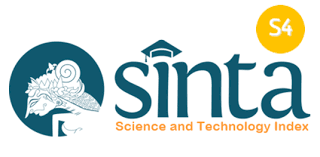REKAYASA BIOPLASTIK UNTUK KEMASAN MAKANAN DARI KHITOSAN LIMBAH KULIT UDANG DAN PATI TAPIOKA, DENGAN MINYAK KELAPA SAWIT SEBAGAI PEMLASTIS
Main Article Content
Abstract
Synthesis of biodegradable polymers is an alternative technology, which can be applied to cope with the problem of petrochemical raw materials packaging waste buildup. The purpose of this study was to obtain information on the effect of chitosan composition, tapioca starch and palm oil as plasticizer on mechanical and thermal properties, crystallinity, and oxygen permeability. Bioplastics was synthesis by blending tapioca starch, chitosan, and palm oil at various compositions. The results showed that bioplastic could be synthesized and printed in the form of film. Bioplastic films showed a low permeability, where the more content of chitosan in a mixture of bioplastics caused the lower permeability to oxygen. Tensile strength of the resulting film was low and the optimum value was achieved on chitosan/starch compoxition of 60/40. Elongation at the film break was strongly influenced by starch composition. High starch composition produced bioplastics with high elasticity. The melting point range was 133-150 °C. Films with the highest value of this parameter were produced from samples with tapioca starch/chitosan ratio of 60/40. Thermal resistance of the sample was determined by tapioca starch/chitosan ratio of 50/50, with weight loss of 41.395% at 475 oC. Almost all films produced in various compositions of chitosan/tapioca starch showed amorphous structure, except sample with tapioca starch/chitosan ratio of 10/90, which was semicrystalline.
Downloads
Article Details
Submission of a manuscript to Jurnal Purifikasi means that the work has never been published in another journal and is not under consideration for publication elsewhere. The author hereby agrees to submit the copyright of the manuscript and its contents to Jurnal Purifikasi, if accepted for publication. Accepted manuscripts will be published in printed form where the ISSN is bound in printed form, not in online form (pdf). Authors are not allowed to publish their work in other forms (journals) without permission from the Jurnal Purifikasi manager.
By submitting a manuscript, the author is deemed to know all the rights and obligations attached to each manuscript.








